Suchandra Dutta, Haobijam James Watt and Kankabati Kalai took part and contributed in the ‘National Workshop on Advanced Research Methodology for the Social Sciences’ held during January 6-11, 2020, in ICAR-RC-NEHR, Umiam, Meghalaya. The workshop was jointly organised by AESA, CRISP, MANAGE, CTCRI and ICAR-RC-NEH Region, Umiam. Here, the proceedings of the session were discussed by them.
CONTEXT
Research is a systematic and purposive investigation of a problem or phenomenon through scientific study. Methodology is the system of methods and rules applicable to research. In today’s data-intensive society, there is a need to understand the complexity of the research environment. Agricultural Extension aims to explain social phenomena and solve problems related to development of individual farmers and farming community at large. It uses scientific explanations to predict and control social phenomena for the greater interest of the farming society. For research to be systematic, controlled, empirical and critical, one needs to follow a systematic approach. One should have methods to create controlled situations. The results of the research should be empirical and critically examined. In order to achieve these strictly laid down conditions, a standard methodology is required to conduct the research. In this backdrop, ICAR Research Complex for North Eastern Hill Region (ICAR RC NEHR), Umiam, Meghalaya, in collaboration with Agricultural Extension in South Asia (AESA), Centre for Research on Innovation and Science Policy (CRISP), ICAR-Central Tuber Crops Research Institute (ICAR-CTCRI) and National Institute of Agricultural Extension Management (MANAGE), jointly organised a National Workshop on ‘Advanced Research Methodology for the Social Sciences’ during January 6-11, 2020.
This national workshop focussed on good practices in conducting social science research investigation, from conceiving of a research idea to its culmination in publication, including literature search, formulation of a research question, study design, funding, conducting research, analysis of data obtained through suitable software and interpretation of results using advanced statistical tools.
A diverse mix of 34 participants – comprising professionals and research scholars primarily from institutions in North-East India, participated in the six-day programme. During the workshop, the participants were provided information on presentations and activities scheduled for the week through regular e-mails. A WhatsApp group was also created for workshop participants and organisers to facilitate this process.
PROGRAMME
Day 1
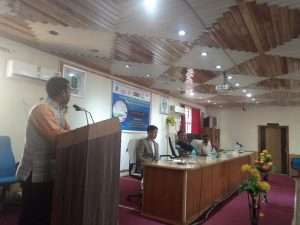 The first day started with the inauguration of the workshop. At the outset, Dr. Pankaj Kumar Sinha (Scientist, ICAR-RCNEH and Coordinator) welcomed the gathering, followed by a brief introduction by Dr. N. Uttam Singh (Head, Division of Social Sciences, ICAR-RCNEH and Organising Secretary) about the ICAR Research Complex for North Eastern Hills Region and its activities in this region. The participants then introduced themselves and explained their purpose for attending the workshop along with their expectations. Dr. B.K. Kandpal (Director, ICAR-RCNEH) in his inaugural address stated that social science disciplines have tremendous potential as they can provide field-based perspectives to refine and restructure research programmes in order to address pressing needs of farmers and other stakeholders. He stressed the need for conducting quality social science research. Dr P. Sethuraman Sivakumar (Principal Scientist, ICAR-CTCRI) briefed the participants about AESA workshop series and its collaborators, which was followed by a vote of thanks by Dr. Pampi Paul (Scientist, ICAR-RCNEH & Coordinator).
The first day started with the inauguration of the workshop. At the outset, Dr. Pankaj Kumar Sinha (Scientist, ICAR-RCNEH and Coordinator) welcomed the gathering, followed by a brief introduction by Dr. N. Uttam Singh (Head, Division of Social Sciences, ICAR-RCNEH and Organising Secretary) about the ICAR Research Complex for North Eastern Hills Region and its activities in this region. The participants then introduced themselves and explained their purpose for attending the workshop along with their expectations. Dr. B.K. Kandpal (Director, ICAR-RCNEH) in his inaugural address stated that social science disciplines have tremendous potential as they can provide field-based perspectives to refine and restructure research programmes in order to address pressing needs of farmers and other stakeholders. He stressed the need for conducting quality social science research. Dr P. Sethuraman Sivakumar (Principal Scientist, ICAR-CTCRI) briefed the participants about AESA workshop series and its collaborators, which was followed by a vote of thanks by Dr. Pampi Paul (Scientist, ICAR-RCNEH & Coordinator).
The workshop started with an icebreaking session handled by Dr. P. K. Sinha where he interacted with the participants and divided the participants into five groups, with a minimum of six members in each group. Unique names were given to designate each group. The participants were assigned to prepare group project proposals that would be presented during the workshop.
In the next session, Dr. P. Sethuraman Sivakumar gave a detailed outline on research in social science – its current status and future prospects. Later, Dr. Pampi Paul delivered a lecture on the philosophical foundations and paradigms of scientific social research.
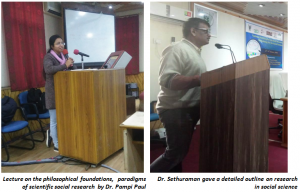
During the afternoon session, Dr. P. Sethuraman Sivakumar introduced the participants to social science research process, starting with methods for identifying research problems, construct conceptualization and hypotheses. Steps for conducting research primarily include selection of research problem, writing problem statement, research purpose, research questions, research objectives, theory, domain, concepts, constructs, variables, premises, proposition and formulation of hypotheses. Every step was clearly discussed by him with examples. Participants learnt about the importance of narrative hooks from his presentation. Followed by this, the participants were given a task to work within their respective groups on research problem identification and construct conceptualization as a hands-on exercise.
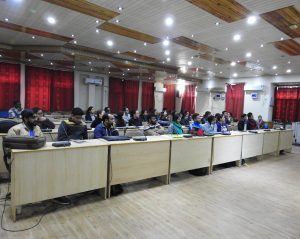
Day 2
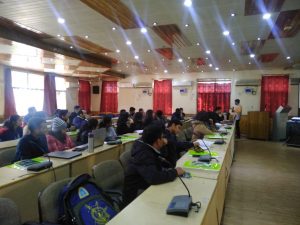 The next day started with a recap of the previous day’s classes on theory, research and construct conceptualisation, variables and hypotheses by Dr. Pankaj Kumar Sinha. He then illustrated various research designs, methods, research approaches and tools for data collection. After a short tea break, Dr. Sethuraman explained at length about ‘Methods of sampling and estimation of sample size’. In this session, a clear distinction was made between sampling frame and sampling point, discussion on different sampling strategies, followed by sampling bias which can lead to errors in data collection. He further elaborated on the ‘sampling strategy – probability sampling and non-probability sampling’. He also explained how sample size can be estimated using a formula. Other sample size guidelines such as pilot testing, and sample sizes for qualitative studies, were also elucidated.
The next day started with a recap of the previous day’s classes on theory, research and construct conceptualisation, variables and hypotheses by Dr. Pankaj Kumar Sinha. He then illustrated various research designs, methods, research approaches and tools for data collection. After a short tea break, Dr. Sethuraman explained at length about ‘Methods of sampling and estimation of sample size’. In this session, a clear distinction was made between sampling frame and sampling point, discussion on different sampling strategies, followed by sampling bias which can lead to errors in data collection. He further elaborated on the ‘sampling strategy – probability sampling and non-probability sampling’. He also explained how sample size can be estimated using a formula. Other sample size guidelines such as pilot testing, and sample sizes for qualitative studies, were also elucidated.
In the afternoon session, Dr. Pankaj Kumar Sinha spoke about ‘Strategies for effective data collection’. He shared his numerous field experiences while collecting data in northeast hilly regions. The field knowledge sharing helped participants understand ground realities in conducting social science research.
Each group presented its research problem in the late afternoon session. They made presentations about how they chose their research problem, formulated the propositions and hypotheses. The session was open for discussion and questions from other group members. Dr. Sethuraman put before each team valuable analysis and suggestions for refining the research proposals. The day ended with hands-on exercise in preparing sampling plan for each research proposal formulated.
Day 3
After a recap by Dr. Pankaj Kumar Sinha and Dr. Pampi Paul, the third day of the workshop began with a presentation from Dr. N. Uttam Singh on data exploration and preparation using SPSS. He explained the steps in data preparation: variable identification, missing data treatment, outlier treatment, testing assumptions for statistical analysis and data transformation. Participants got acquainted with treatment of missing data through deletion or through imputation methods, outliers and how to deal with them and detect them using box plots techniques. Participants undertook a hands-on exercise to practically understand this concept in SPSS using the dataset given to perform statistical tests – t-test, paired t-test, crosstabs and chi-square test.
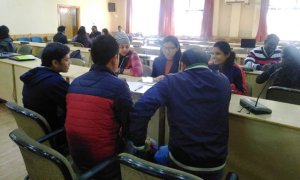 The next session’s topic was very contemporary for the participants. It was on Discrete Choice modelling. The discussion was headed by Dr. Aniruddha Roy (Scientist, Agri-Economics, ICAR-RC-NEH). He explained it as qualitative choice models that describe and predict choices between two or more discrete alternatives, such as entering or not entering the labour market, or choosing between mobile models. Using simple examples from daily life, he explained the concept.
The next session’s topic was very contemporary for the participants. It was on Discrete Choice modelling. The discussion was headed by Dr. Aniruddha Roy (Scientist, Agri-Economics, ICAR-RC-NEH). He explained it as qualitative choice models that describe and predict choices between two or more discrete alternatives, such as entering or not entering the labour market, or choosing between mobile models. Using simple examples from daily life, he explained the concept.
The afternoon session was headed by Dr. Sethuraman and assisted by Dr. Pampi Paul. They briefed the participants on the questions to be answered by basic statistics, such as, ‘What is going on’ by frequencies, mean, median, SD; relationship by correlation; causation by regression, comparisons – by t-test, ANOVA and similarities by factor/cluster analysis. They also outlined levels of measurement and types of variables, followed by guidelines for choosing statistical tests, tests of significance, critical region and also spoke elaborately about various tests. The day concluded with hands-on practice of statistical analysis using SPSS.
Day 4
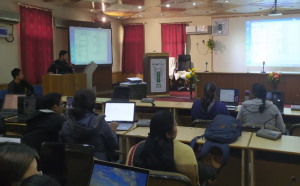 After the recap from Dr. Pankaj Kumar Sinha, the first presentation of the day began with Scale Development using Structural Equation Modelling (SEM) by Dr. Sethuraman. The session continued with the topics of exploratory and confirmatory factor analysis. Lectures followed on reliability and validity testing along with hands-on sessions using SPSS software. The contents discussed under the topics of reliability and validity testing were: different types of reliability, internal consistency of reliability, different types of validity, discrimination index, and so forth.
After the recap from Dr. Pankaj Kumar Sinha, the first presentation of the day began with Scale Development using Structural Equation Modelling (SEM) by Dr. Sethuraman. The session continued with the topics of exploratory and confirmatory factor analysis. Lectures followed on reliability and validity testing along with hands-on sessions using SPSS software. The contents discussed under the topics of reliability and validity testing were: different types of reliability, internal consistency of reliability, different types of validity, discrimination index, and so forth.
The afternoon session was a hands-on practice session on how to perform SEM using AMOS SPSS software along with an example of computer use behaviour of extension functionaries. The day ended with handful of practicing exercises using AMOS SPSS software for confirmatory factor analysis.
Day 5
 After a quick recap of previous sessions by Dr. Sethuraman, the session started with a brief introduction to descriptive statistics by Dr. N Sivaramane (Principal Scientist, NAARM, Hyderabad). He made a presentation on modelling human decisions in the adoption of agricultural technologies using LOGIT and PROBIT models. He stated that the most prevalent method in adoption studies is the LOGIT model and it is used in identifying the factors influencing adoption.
After a quick recap of previous sessions by Dr. Sethuraman, the session started with a brief introduction to descriptive statistics by Dr. N Sivaramane (Principal Scientist, NAARM, Hyderabad). He made a presentation on modelling human decisions in the adoption of agricultural technologies using LOGIT and PROBIT models. He stated that the most prevalent method in adoption studies is the LOGIT model and it is used in identifying the factors influencing adoption.
After a small tea break, he introduced ‘R’ and ‘R studio’ software that works with dos and command for advanced statistical analysis. He practically showed stepwise installation procedures and properties of these software. The participants were encouraged to do some exercises using R and R studio. Interpretation of results was also explained by him.
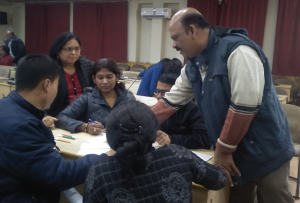 The afternoon session was very interesting. An exciting session on Thematic Analysis by Dr. P. Venkatesan (Principal Scientist, NAARM, Hyderabad) provided clarity on its essential concepts. He stated the methods for identifying concepts in extension research, identification of theme, types of Thematic Analysis, phases of Thematic Analysis, steps in Thematic Analysis with examples. Thematic Analysis approaches are appropriate when samples are determined and defined before proceeding with the study. Thematic Analysis offers the flexibility for starting data analysis at any time during the study, where there is no association between the data gathered and results of the process itself. More importantly, it provides the flexibility for approaching research patterns in two ways, i.e. inductive and deductive.
The afternoon session was very interesting. An exciting session on Thematic Analysis by Dr. P. Venkatesan (Principal Scientist, NAARM, Hyderabad) provided clarity on its essential concepts. He stated the methods for identifying concepts in extension research, identification of theme, types of Thematic Analysis, phases of Thematic Analysis, steps in Thematic Analysis with examples. Thematic Analysis approaches are appropriate when samples are determined and defined before proceeding with the study. Thematic Analysis offers the flexibility for starting data analysis at any time during the study, where there is no association between the data gathered and results of the process itself. More importantly, it provides the flexibility for approaching research patterns in two ways, i.e. inductive and deductive.
After the tea break, each group were given a verbatim transcription of the content in original language and were asked to analyse the content following the steps learned in Thematic Analysis. The session ended with a very interesting and interactive hands-on experience by the participants in qualitative content analysis.
Day 6
Recap of Day 5 by Dr. Pampi Paul and Dr. P.K. Sinha. The final morning session started with a discussion on publications in social science research and various facets of publishing research by Dr. N Sivaramane, Dr. P. Venkatesan and Dr. Sethuraman. They focussed on various unidentified places where extension scientists can publish their research. Moreover, researchers could publish more in the form of blogs or working papers or Good Practice notes in certain niche domains rather than only focusing on high-impact journals. They acquainted the participants on how the review process is carried out, and how the reviewer’s critical comments can help in improving the manuscript, which is crucial for extension professionals, especially if they want to publish quality research papers. They also guided the participants on errors often made by researchers in writing a manuscript and gave an overview of the importance of technical writing and various policy research findings.
Dr. K.K Baruah, Director in-charge ICAR RCNEHR, was the Chief Guest of Honour in the valedictory function. Dr. N Sivaramane, Dr. P. Venkatesan, Dr. Sethuraman and Dr. N. Uttam Singh were the other dignitaries at the valedictory session. When asked to share their feedback, the participants expressed that the programme was useful and unique. They also emphasised the need for more such trainings where hands-on training is given more importance than theory learning.
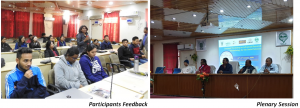
OUR IMPRESSIONS
We are very grateful to AESA, CRISP, MANAGE, CTCRI and ICAR-RC-NEH for taking such an initiative to improve research in social science. The workshop served as an ideal platform for students and professionals to develop their skills and research ideas. It was need of hour for students who were working on their thesis. It gave a great opportunity and built confidence to carry out research in systematic ways. The group of 34 participants were from different parts of India, comprising teaching professionals, consultant and research scholars from various sub-disciplines of agricultural and allied social sciences. The mutual interaction and coordination between resource persons and participants made the workshop highly valuable and energetic. Every session of the workshop was remarkable. There was no lag and all the classes were conducted systematically. The organizer and coordinators communicated clearly, explicitly and interestingly with exact examples. All the topics included in the course were important, but given the vastness of the course and due to time constraint the schedule of the workshop was hectic. Inspite of all, doubts were cleared at the end of each topic and students were given an opportunity to discuss their queries with the experts. Hands-on learning was strengthened by dividing the participants into five groups with different backgrounds for close discussions. These group discussions were a productive tool where the participants could put the contents of the classes into practice by applying the ideas gained there. All participants were actively involved in group activities. At the end of the workshop, each group was able to come up with a research proposal in a systematic manner which can now be taken up for field level studies.
The participatory approach of the workshop was beneficial as research related issues encountered by the participants were discussed and solutions proposed by experts. The trainers encouraged the participants to openly share their thoughts and problems experienced while conducting extensive research. There was still a scope for improvement in sessions like literature search and Mendeley. Review of literature not only helps in finding variables, but also helps in building different theoretical and methodological approaches for research study. Also, there is a need for detailed discussion on case study and ethnographic study.
The enthusiastic approach of the organizers is praiseworthy. The arrangements done by the coordinators for workshop sessions, food and accommodation were much appreciated. Important information on topics, timing, venue and transport arrangements were updated on the WhatsApp group that included both participants and the organising team. Finally, this national workshop on Advanced Research Methodology not only generated useful insights and confidence, but also acts as a stimulant for academic growth. Sound conceptual understanding of various research methods, research instruments, tools and techniques acts as an essential prerequisite for conducting empirical research. The recent innovations in statistical applications, availability of statistical software applications allow research scholars to test more complex, multilevel and dynamic models.
Above all, it offered much encouragement to new aspirants in the field of social science research to unravel the subtle lying realities. Furthermore, we are also looking forward for more such kind of workshop in future to enhance our knowledge and research work.

Suchandra Dutta, PhD Research Scholar, Department of Agricultural Extension, Bidhan Chandra Krishi Viswavidyalaya, West Bengal (E-mail: suchanddradutta@yahoo.in)

Haobijam James Watt, PhD Research Scholar, Department of Agricultural Extension, Palli Sikhsha Bhavana, Visva Bharati, West Bengal (E-mail: haobijamjameswatt@gmail.com)

Kankabati Kalai, Enthusiast (PhD Agricultural Extension), Indira Gandhi Krishi Vishwavidyalaya, Raipur, Chhattisgarh (E-mail: kankakalai@gmail.com)

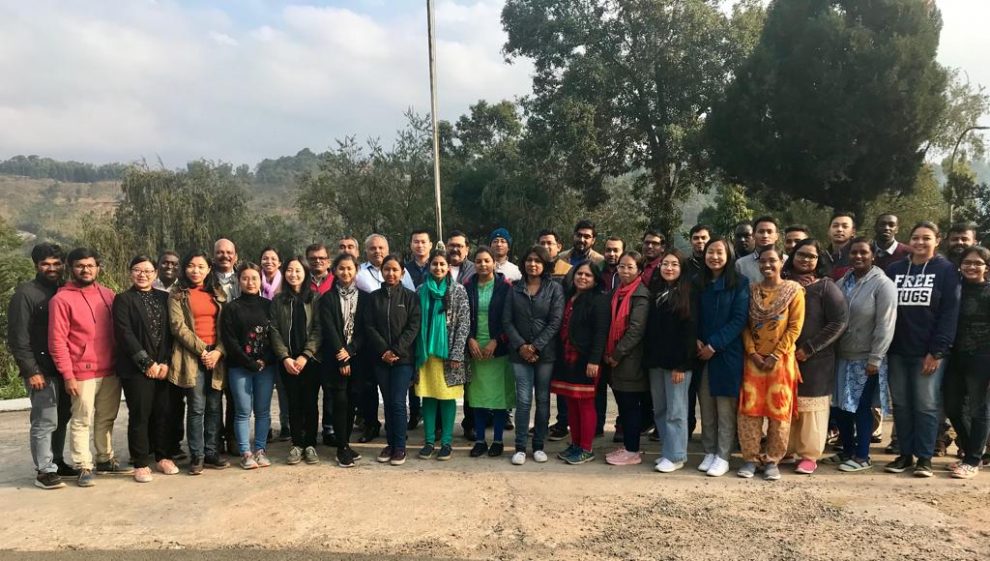
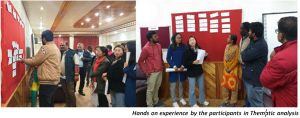

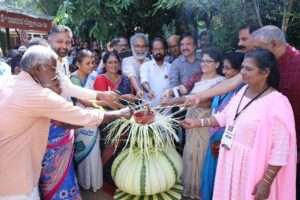

Add Comment